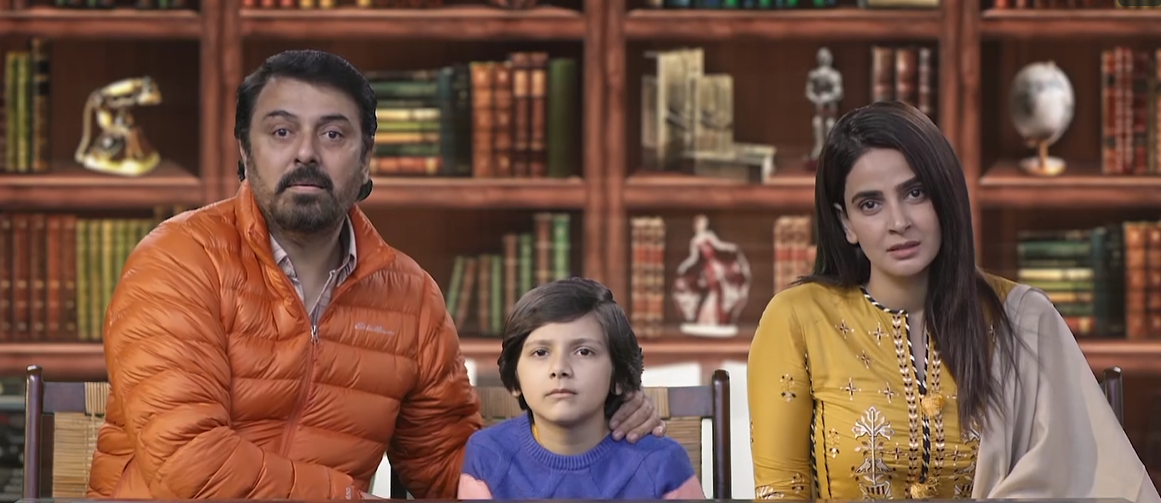1648450667-0/3-(1)1648450667-0.png)
‘Mrs. & Mr. Shameem’ Review: Naumaan Ijaz, Saba Qamar’s solid performances save society, screenplay
Although a bit lengthy, the family drama is a must-watch.
KARACHI:
Before the release of Mrs. & Mr. Shameem, actor Naumaan Ijaz had spoken about how it took the script 13 years to finally materialise. That statement and the hype created by the neatly-cut trailer was enough for any Pakistani drama buff to be excited to watch the ZEE5 series, so if there was one thing that we were already high on, it was the expectations. And while the show turned out to be a fun ride, you’ll be left asking yourself towards the end whether it was the binge-eating that made you sit through or the show itself.
SPOILER ALERT!
On the get-go, you know it’s a cliché romantic tale where a hot-headed, rebellious and independent Umaina (Saba Qamar) gets pregnant after her “manly” boyfriend, Bilal, (Agha Mustafa Hassan) leaves her for an inflated bank account. Heartbroken and abandoned by family, she comes to her “gay” best friend, the effeminate Shameem (Ijaz), who is secretly in love with her and offers to marry her and adopt the child so she isn’t ridiculed by society.

Photo credits: Zee Zindagi/Instagram
As the story unfolds, it only gets more predictable. Still, in love with Bilal, Umaina refuses to respect Shameem or accept him as her husband, and honestly, it gets difficult to sympathise with her later as she disregards the only window of love in a suffocating room of betrayals. She goes through postpartum depression and Shameem takes care of Ali, her son until Umaina gains some sight of reality. With Shameem's support, she gets over it and realises her love for her son. But alas, their happy ending doesn’t come so soon.
1648450668-1/2-(1)1648450668-1.png)
However riddled with clichés, Mrs. & Mr. Shameem is the sort of predictable family drama that everyone delightfully watches– for its relatable characters, good direction, acting and several turning points. The entire series runs in flashback, with the duo reflecting on their lives on a talk show, called Hope. In the end, it is revealed that the show is being hosted by Ali himself, which is predictable by the nature of his questions.
Kudos to the acting powerhouses, Qamar and Ijaz for working their magic in the show. Ijaz’s deep-set kind eyes do most of the talking for the pain he endures in the show for how his character is perceived. It’s almost unreal to see the “godfather of Pakistani dramas’ so convincingly mould himself into the tender, kind, ever-forgiving, pure character of Shameem. From his walk to his wardrobe to his expressions, everything is on point. With Qamar, you feel her painful but unconscious transformation from an outgoing person to a complete recluse.

However, the “unconventional” trope that the show rides on is nothing short of a marketing gimmick. If you keep the Pakistani audience in mind, yes, it’s fresh for its narrative and can be called a classic, but in no way were the characters unconventional, and sadly, the actors fell for the trap.
Thematically speaking, the series shows submissive women accumulating strength to call out abusive partners, opens conversations around sexual assault and rape by trusted religious ulemas in madrasas, and sees rape survivors speak up in front of visiting prospects for an arranged marriage. Without using the word gay, it raises sensitivity around femme behaviours and the horrors of not passing for a straight, cis man.
Although significant and deserving of applause, it is pertinent to mention that after the first few episodes, the abundance of social issues and stereotypes that it aims to question, counter and normalise feel forced and lead on the story unnecessarily.
With 20 episodes, each about 45 minutes long, the show could have skipped some ethical reality checks, had fewer scenes of Shameem cradling the baby, and they could’ve easily narrowed it down to 15 episodes instead. From postpartum depression to black magic to infertility to monstrosity in the name of religion, it seemed like Saji Gul compensated for all the missed opportunities in the things he wanted to write about but couldn’t for the Pakistani telly.
An interesting thing that strikes a chord is how the story is also about spreading awareness about AIDS, but they manage to weave the taboo subject into a love story that consumes you enough to believe and sympathise with the characters when it comes to disease awareness in the second half of the series.
To sum it up, although a bit lengthy, Mrs. & Mr. Shameem is a must-watch. Here’s hoping our Pakistani audience gets to see quality content on television that holds a non-preachy mirror without losing on its entertainment value.
Have something to add to the story? Share it in the comments below.
-(1)1730443275-0/Copy-of-Untitled-(60)-(1)1730443275-0-270x192.webp)

1730095495-1/WhatsApp-Image-2024-10-28-at-11-04-18-(1)1730095495-1-270x192.webp)












COMMENTS (2)
Comments are moderated and generally will be posted if they are on-topic and not abusive.
For more information, please see our Comments FAQ